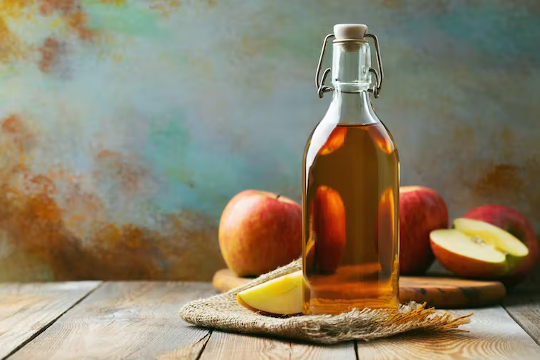
Apple cider vinegar is said to help with weight loss, heart health, managing cholesterol and blood sugar levels. Shutterstock/VasiliyBudarin
Apple cider vinegar has become a popular home remedy in recent years and has been used for centuries in cooking and medicine. It’s thought to help with a wide range of health issues, including high cholesterol, blood sugar levels, obesity and high blood pressure. It’s also said to help with eczema and stomach acid reflux, but this has not been scientifically proven.
Because apple cider vinegar is a good source of nutrients like potassium, magnesium, calcium, and vitamin C, it’s believed to be good for your body as a whole. Apple cider vinegar is usually consumed with foods as an additive to sauces, salad dressings and marinades.
Some people also drink apple cider vinegar, diluted in hot or cold water. Pills, tablets, powders and gummies also exist. Diluted apple cider vinegar can also be used externally in baths, wet wraps or hair rinses. But because of the lack of research about apple cider vinegar, there are no official dosage suggestions to date.
Research has shown that apple cider vinegar has both antimicrobial and antioxidant effects – including anti-oral biofilm effects. Oral biofilms, also known as dental plaque, consists of a sticky layer of bacteria on tooth surfaces. This means that in theory, it may be able to reduce plaque levels on our teeth, but there have been no clinical studies to test this.
Get The Latest By Email
Apart from a lack of evidence, there is another important reason why apple cider vinegar is probably not the best option to reduce plaque: like other kinds of vinegar, it’s high in acid, and studies indicate that it may cause erosion to our bodily tissues if not diluted. This includes the soft tissues in our mouth as well as our teeth and tooth enamel.
Teeth and acids
Enamel is the mineralised material that coats our teeth and is the hardest tissue in the human body. Enamel covers the crown which is the part of the tooth that is visible in the mouth. However, the main portion of the tooth is dentin, which is located underneath our enamel. Dentin is also a hard tissue, similar to bone, and has a direct connection to the dental pulp in the centre of our teeth, containing nerves and blood vessels.
The enamel helps protect our teeth from chewing, biting, hot and cold temperatures, and potentially damaging chemicals. Some chemicals though, like acids, can still damage the enamel over time, if they get in contact with our teeth for longer periods. Acids are able to dissolve and soften the minerals in our enamel, potentially making it thinner over time. This is especially the case if we brush our teeth or chew hard foods directly after an acid attack, which can accelerate enamel loss.
When enamel erodes due to vinegar acids, our teeth may become more sensitive. This means they react more to hot or cold foods, drinks, and sweets since the dentin layer underneath the enamel is much more sensitive due to a direct connection to the nerves inside our teeth. In some more advanced cases, when the enamel has been completely eroded by acids, the dentin is exposed and unprotected, and at this stage, the teeth will erode, and wear and tear a lot faster.
What to do
Dentists can recognise this issue by looking at the shape and colour of the teeth, by asking about sensitive teeth and by taking a diet history of patients to identify foods and drinks containing acids. Though when it comes to false teeth, some dentists have actually been recommending soaking acrylic dentures in diluted vinegar due to its antifungal properties and its ability to dissolve calcified plaque deposits (tartar).
That said, a thin layer of proteins and slime from our saliva will form a layer on our enamel, which can help to protect it from acids. Also, our saliva has many minerals, which are able to re-mineralise the outer layers of damaged enamel, but this takes time - usually several hours. Fluorides in toothpaste and mouthwashes will also strengthen the outer enamel layers.
So if you do regularly drink apple cider vinegar and want to avoid tooth erosion, it’s best to follow a few rules. Always water down apple cider vinegar and consider drinking it through a straw to protect your teeth. It also helps to consume apple cider vinegar together with your main meals, to reduce the number of acid attacks per day.
Avoid apple cider vinegar products that require lots of chewing (like acidic gummies). And do not brush your teeth directly before or after drinking apple cider vinegar. Instead, wait for about half an hour. When you brush, be gentle (not too abrasive), use fluoridated toothpaste, and do not use a hard toothbrush. To find out whether it’s safe for your teeth to use apple cider vinegar, you can also speak to your dentist about your risk of developing tooth erosion.![]()
About The Author
Josefine Hirschfeld, Associate Professor and Honorary Consultant in Restorative Dentistry, University of Birmingham
This article is republished from The Conversation under a Creative Commons license. Read the original article.
books_food








